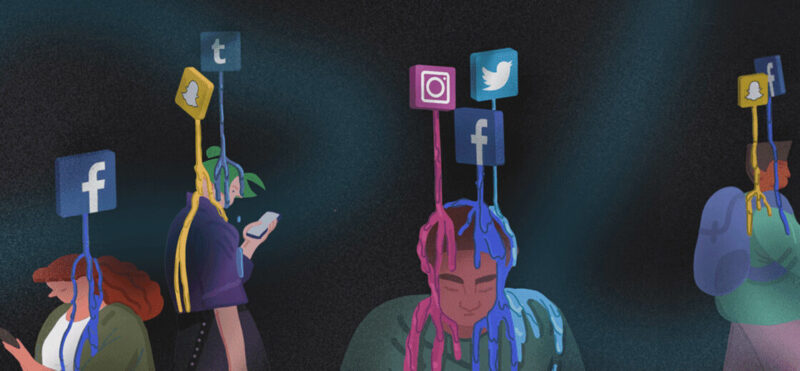It is no secret that social media is considered to be one of the most significant trends of the twenty-first century. Approximately four billion individuals utilize social media as of right now. That is roughly half of all people on the planet. The number of users, however, does not constitute the most startling statistic. The more astounding thing is that the average daily time spent on social media is two and a half hours! This means that the time we spend on social media is practically half of our life if we don’t count the eight hours of sleep and ten hours of work and commuting.
The number of conversations about a phenomenon rises as it grows in popularity. While some individuals talk about the drawbacks of social media, others are curious about the influence it is having on people. If you belong to the latter category, consider yourself fortunate to have found this page. We can say this with confidence because we will describe the various ways in which social media negatively affects people in this article. Notably, these are not views that are contestable; in fact, the biggest beneficiaries of social media such as internet service providers also agree to these. Notably, we are not trying to convince you to unsubscribe to Xfinity internet plans or whichever kind of internet deals you are subscribed to; all we are asking you to do is to be cautious of your internet usage, especially social media usage.
Absence Of Personal Contact
We cannot possibly take the time to really get dressed and go to a family member’s or friend’s residence and spend time with them if we are spending half of our spare time in front of screens. Although one could argue that the people we communicate with most frequently on social media are our family and friends, in-person contacts are still preferred, according to the generation before us. The assertion that even a brief embrace can lessen the risk of developing depression is supported by a large body of scientific evidence. So put down your phone, get ready, get out, and mingle!
Effect on Children
Children are greatly impacted by social media as well. After all, how can young people ever find the time to play sports and develop the many social skills essential for future success on both a personal and professional level if all they do is browse through their Instagram feeds? Indeed, children’s physical health has suffered greatly as a result of their excessive use of social media. Additionally, children of this age frequently report feeling less cheerful than children of earlier generations since they no longer receive the endorphin boost they experience when participating in sports.
Sports also help kids learn how to compete. Lack of it results in them losing motivation to excel in school and, later in life, in their careers. Teenage years are after all formative years.
Bruises Our Self-Assurance
One way that excessive social media use damages us is by reducing the healthy competitiveness that comes with participating in sports. On the other side, though, it harms us because it fosters unhealthy rivalry. Anytime we see an Instagram “friend” post a photo of themself on the beach, we can all relate to feeling inadequate. If you’re wondering why we placed “friend” in inverted commas, it’s because many of the individuals we believe are vying for our attention aren’t even real-world acquaintances.
Lesser Privacy
Not only do we learn too much about other people, but we also reveal more about ourselves to the outside world than we ever intended to. Your stalking high school classmate doesn’t need to know where you are now clubbing, and neither does your conservative relative need to know how you dressed for the beach. Additionally, if you have taken time off from work, your coworkers have no business monitoring your Snapchat whereabouts to determine if your break was “genuine” or not.
While the instances of invasion of privacy mentioned above all included situations in which you consciously or mistakenly allowed others to learn more about you, there are other situations in which information is disclosed without your knowledge at all. Consider the Cambridge Analytica instance, when highly private data on polling tendencies for voters was exposed. This led to a federal crisis and an uproar on a global scale, inflicting great disgrace on the United States of America. Meta, formerly known as Facebook, was in charge of maintaining the information’s security but failed to do so. We aren’t mentioning the corporation to disparage it; rather, we’re only doing it to demonstrate how even the most wealthy businesses, with billions in revenue, can fail to keep your information private.
Conclusion
We hope this post has helped you understand how social media harms us and how to avoid it. Make sure neither you nor your loved ones become overly engrossed in it!



